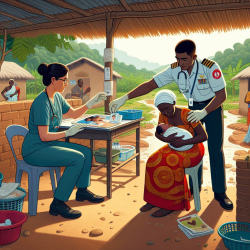Introduction
In the realm of public health education, the integration of Maternal and Child Health (MCH) frameworks into graduate training programs has emerged as a pivotal strategy for addressing persistent health inequities. The research article, "The Critical Value of Maternal and Child Health (MCH) to Graduate Training in Public Health: A Framework to Guide Education, Research and Practice," provides a comprehensive framework designed to enhance the training of future public health leaders. This blog explores how practitioners can leverage the insights from this framework to improve their skills and encourages further research in this crucial area.
The Framework: A Triad of Education, Research, and Practice
The framework outlined in the research article underscores the alignment of core MCH training components with the Council on Education for Public Health (CEPH) competencies. It emphasizes three primary components:
- Education: MCH education fosters interdisciplinary and systems thinking approaches, preparing students to understand and tackle health inequities across the lifespan.
- Research and Evaluation: This component focuses on generating robust evidence for health determinants and strategies to improve health within a life course framework.
- Practice: MCH training promotes community-engaged approaches, translating research into effective public health practice and policy.
Implementing the Framework in Practice
Practitioners in public health can enhance their skills by integrating the MCH framework into their practice. Here are some actionable steps:
- Adopt a Life Course Perspective: Incorporate the life course approach into all aspects of public health practice, focusing on health and development at each life stage and over time.
- Engage in Interdisciplinary Learning: Collaborate with professionals from various disciplines to foster a holistic understanding of health issues and solutions.
- Emphasize Community Engagement: Develop and implement community-based interventions that address local health needs and disparities.
- Focus on Equity: Integrate equity-focused strategies into public health practice to address and reduce health disparities.
Encouraging Further Research
The framework invites further iteration and adaptation to diverse and emerging public health programs. Practitioners are encouraged to engage in research that explores the application of the MCH framework in various contexts. Potential research areas include:
- Evaluating the impact of MCH-focused curricula on public health outcomes.
- Exploring the role of MCH training in promoting health equity.
- Assessing the effectiveness of community-based interventions informed by the MCH framework.
Conclusion
The integration of MCH frameworks into public health graduate training programs is essential for preparing the next generation of public health leaders. By adopting a life course perspective, engaging in interdisciplinary learning, and emphasizing community engagement and equity, practitioners can enhance their skills and contribute to addressing persistent health inequities. For those interested in delving deeper into this topic, I encourage you to explore the original research paper: The Critical Value of Maternal and Child Health (MCH) to Graduate Training in Public Health: A Framework to Guide Education, Research and Practice.










